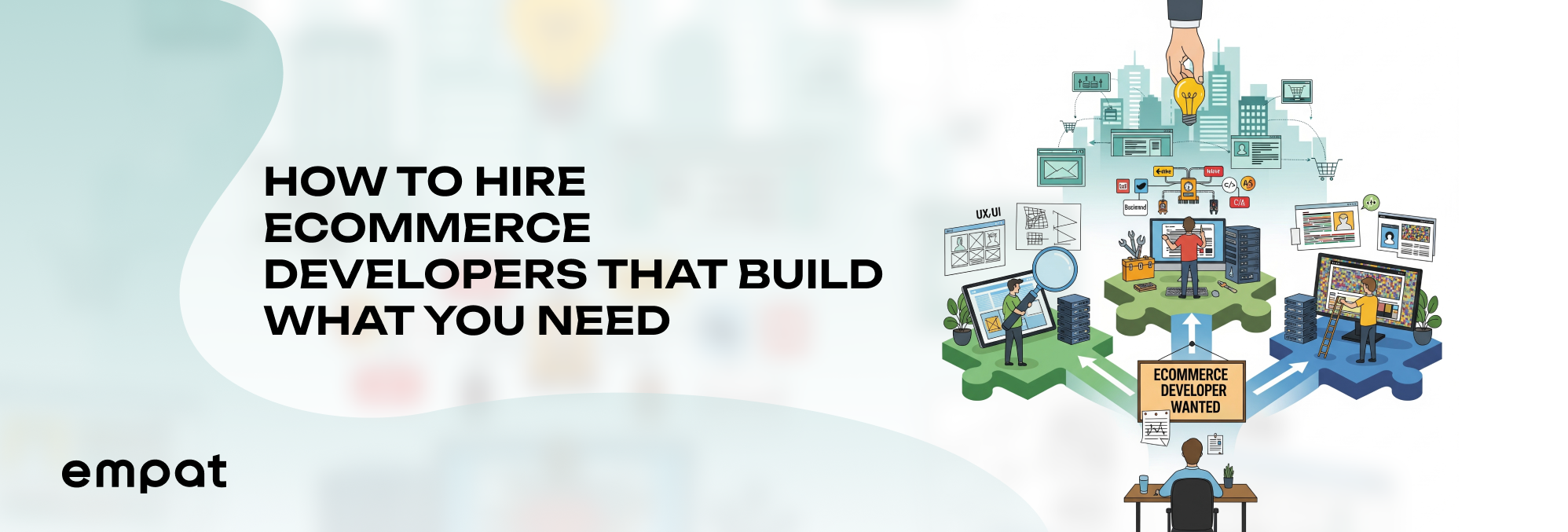
Discover essential tips for hiring eCommerce developers to boost your online business. Ensure success by making informed hiring decisions. Read more!

Looking to hire eCommerce developers for your next project, but not sure where to start? You're not alone.
In case you're building a new online store, improving an existing one, or adding custom features, the right developer can make or break your success.
In fact, global eCommerce sales are expected to reach $6.4 trillion in 2025, and businesses that move quickly with the right tech partners have a clear edge.

In this guide, we’ll walk you through everything you need to know — from how to hire eCommerce developers, to what skills to look for, where to find them, and how much it might cost.
If you’re looking to hire eCommerce developers, start by defining your needs. From there chooseyour e commerce platform — like Shopify, Magento, WooCommerce, or a custom-built solution. Next, define your project’s scope: are you building from scratch? Adding new features? Rebuilding for better performance?
Then, pick the right hiring model. You can:
Look for developers with solid experience in:
When you hire eCommerce developers, it isn’t just for brand-new stores — there are many moments in your business journey when bringing in the right tech help makes all the difference.
Here are the most common situations where hiring specialized eCommerce developers makes sense:
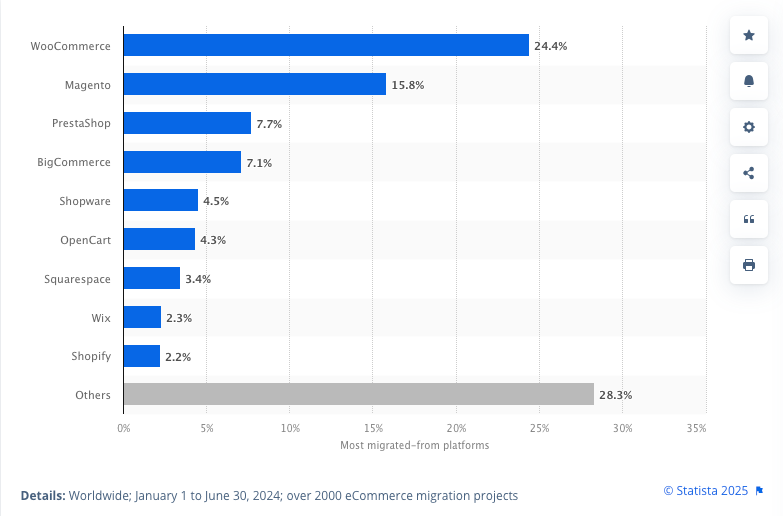
Hiring a skilled eCommerce developer isn’t just about coding — it’s about building an online shopping experience that’s fast, functional, and conversion-driven. When you’re launching a new store or improving an existing one, the right developer will understand both the technical side and the business goals behind your project.
Here are the key things to look for:
30% of eCommerce businesses in the US use Shopify, while the most popular platform in the UK is Magento. A good developer should have hands-on experience with your specific tech stack.
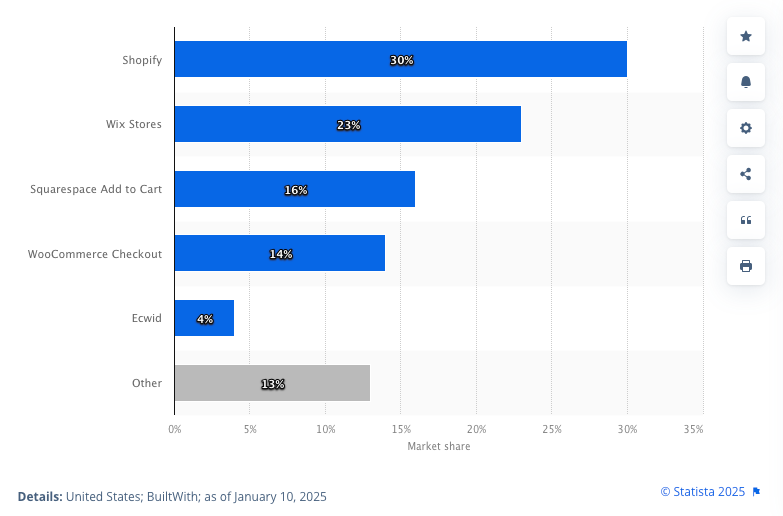
Here's what that might look like:
Why this matters: eCommerce experts who are familiar with your platform can deliver faster, write cleaner code, and incorporate security measures to avoid common pitfalls that cause performance issues.
Top eCommerce developers need to ensure effective software development. They also need to consider how your customers experience your website. The senior developers understand the importance of speed, responsive web design, clarity, and smooth UX.. Look for dedicated eCommerce developers who:
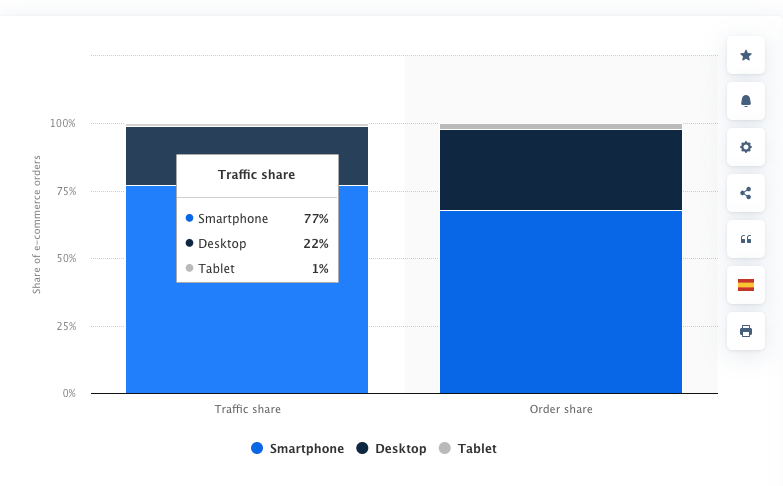
Your eCommerce store likely needs to talk to a range of other systems: for payments, shipping, customer data, marketing, and more. Top eCommerce developers should be confident working with:
Why it matters: Seamless integrations save you hours of manual work and give your customers a better experience.
Ecommerce sites are always changing and improving. You may need to add new products, build out features, or expand to new regions. A dedicated eCommerce developer writes code that is:
Clean, well-organized code also makes it easier for future developers (or teams) to pick up where others left off.
While analytics isn't the core responsibility of a developer, having a working understanding of technical concepts and eCommerce metrics is a big plus. Top eCommerce developers need to understand how to support marketing and data teams.
Look for developers who know how to:
This extra layer of insight ensures that what they build is not only functional but also performance-driven.
While technical skills are very important, don’t overlook communication and teamwork.
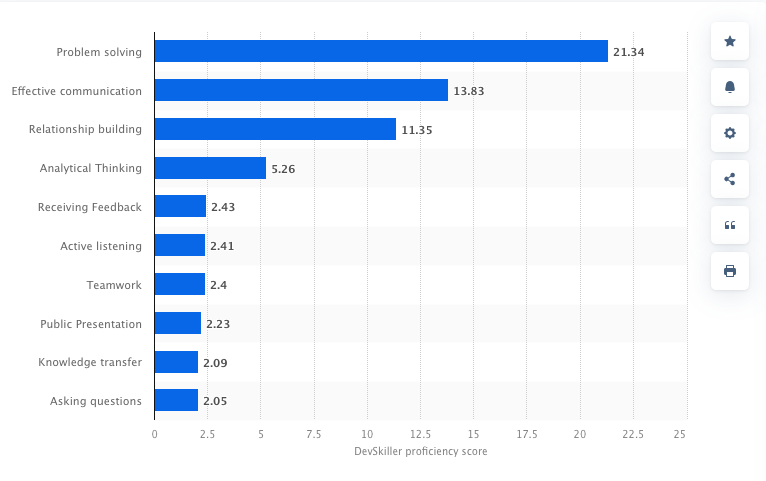
Experienced eCommerce developers:
The cost to hire eCommerce developers depends on several factors: your tech stack, the complexity of your project, how fast you need to move, and the hiring model you choose. Below is a breakdown of typical cost ranges and what to expect with each option:
Freelancers can be a budget-friendly option for hiring remote developers, especially for small tasks like setting up a payment gateway, adding new features, or fixing bugs.
You’ll find many freelancers on platforms like Upwork or Fiverr, but the challenge is search for quality and reliability.
If you don’t have in-house tech leadership or project management, you’ll also need to handle deadlines, communication, and quality control yourself, which can become a time sink for growing businesses.
Hiring full-time eCommerce developers can be a great option if you’re building a long-term product and want someone deeply embedded in your team.
They’ll be more aligned with your company culture and available daily to respond to updates, feedback, or emergencies.
However, in-house hiring takes time and resources. You’ll need to handle:
It’s a long-term investment, which may not be ideal if you need to launch quickly or have fluctuating workloads.
Software outsourcing gives you access to a complete eCommerce team without the delays or overhead of building one from scratch.
You get:
Agencies are ideal for startups, fast-moving teams, and brands that want to stay lean. With over 300 completed projects and experience working with early-stage startups, scaleups, and non-tech founders, Empat delivers eCommerce solutions that are built to grow with your business.
💡 Empat’s flexible engagement models are tailored for startups and growth-focused brands — whether you need an MVP, custom feature development, or ongoing support.
{{first}}
Once you know what kind of professional you need, the next step is deciding where to hire eCommerce developers. There are several popular options, each with its own benefits and trade-offs. Here's a breakdown to help you choose the right fit based on your goals, timeline, and budget.
Examples: Upwork, Fiverr, Freelancer
Freelance platforms offer fast access to global talent, with flexible pricing and no long-term commitment. Ideal for small tasks or short-term help.
Pros of freelance marketplaces ✅ |
Cons of freelance marketplaces ❌ |
Affordable hourly/project rates |
Varying levels of quality |
Huge talent pool |
Requires hands-on vetting and project management |
Flexible contracts |
Risk of missed deadlines or inconsistent code quality |
Examples: Toptal, Arc
These platforms pre-vet e commerce developers, so you're more likely to find highly skilled professionals. Best for complex work where quality is non-negotiable.
Pros of talent networks ✅ |
Cons of talent networks ❌ |
Vetted, experienced developers |
Higher cost |
Streamlined hiring process |
May have limited availability in niche stacks |
Strong communication and reliability |
Often better suited to mid- to long-term engagements |
Hiring an experienced agency gives you access to an entire team, not just a developer. Agencies provide full-cycle development with project managers, mobile app developers, designers, testers, AI developers, and scalable engineering support.
Pros of development agencies ✅ |
Cons of development agencies ❌ |
All-in-one team: devs, PMs, QA, designers |
Slightly higher initial cost |
Faster onboarding and launch speed |
May require an initial discovery stage |
Scalable for MVPs, product growth, or rebuilds |
Team availability may vary |
No need to handle hiring, HR, or legal overhead |
– |
Building your own in-house team can be the right move for long-term product development, especially if eCommerce is your core business.
Pros of in-house web development ✅ |
Cons of in-house web development ❌ |
Full-time dedication to your project |
Long hiring process |
Deep integration with your company culture |
Higher salary, benefits, and overhead costs |
Easier collaboration with internal teams |
Requires ongoing management and HR support |
Bottom line:
The best hiring model depends on your timeline, budget, and in-house capabilities. If you need to move fast, stay flexible, or avoid the hassle of hiring and managing developers yourself, partnering with a full-cycle agency can save time and reduce risk.
But if you’re building a long-term product team and have internal resources to manage development, an in-house hire or a hybrid approach could work best. The key is to choose a setup that aligns with your goals, both now and as you grow.
For startups and growing brands, outsourcing exciting projects like building eCommerce software development solutions can be an effective decision, especially when speed, flexibility, and cost-efficiency are priorities. Instead of spending months building an internal team, outsourcing gives you immediate access to experienced talent and proven workflows.
Here’s why it works:
Outsourced teams are ready to jump in — no recruitment, no onboarding delays. This is especially useful if you're aiming to validate your idea fast or hit a tight market deadline.
Hiring developers in-house comes with added responsibilities: recruitment, interviews, contracts, onboarding, and even legal compliance in different regions. Outsourcing cuts through all of that, so you can stay focused on your product and business.
Experienced outsourcing partners come with developers who already know the ins and outs of eCommerce platforms, integrations, performance tuning, and user experience best practices.
It’s not just hiring developers for startups. With the right partner, you get access to a full team, including:
This is ideal for businesses that don’t yet have a full in-house product team but need end-to-end support.
Outsourcing gives you flexibility — whether you need to ramp up quickly before a product launch or scale back after peak seasons. This adaptability is helpful in eCommerce, where sales cycles and campaign intensity can fluctuate.
At Empat, we’ve helped startups, scaleups, and large brands launch fast, iterate smarter, and grow efficiently, without the traditional overhead of hiring. Our approach to startup software development means you get the exact team you need, when you need it, aligned with your goals and product roadmap.
Hiring a dedicated eCommerce developer isn't just about reviewing resumes, but also about ensuring they can contribute to customer satisfaction. It’s about making sure they understand your goals and have the experience to deliver real results. Whether you're bringing on a freelancer, an in-house hire, or a full team, asking the right questions upfront can save you time, money, and headaches later on.
Here are key questions to include in your hiring process:
Make sure their experience matches your tech stack. For example, if you’re using Shopify, they should know Liquid; if it’s Magento or WooCommerce, they should be fluent in PHP. If you’re going headless, check for React, Next.js, or custom API work.
Ask for real-world examples — not just code snippets or GitHub links. You want to see what they’ve built, how it performs, and whether it aligns with your expectations for UX, design, and functionality.
Speed and mobile experience can boost sales. A solid developer should be able to talk through how they:
eCommerce sites rely on tools for payment processing, inventory, shipping, CRM, and more. Ask how they’ve previously handled:
You’re not just hiring someone to write code. You're trusting them to launch a stable, working product. Check their process:
Asking these questions will help you spot not only technical capability but also how seriously a developer takes quality, timelines, and your customer experience.
The world of eCommerce isn’t slowing down — and neither are your competitors. Today’s shoppers expect speed, seamless experiences, and personalization. To keep up, your development team needs to do more than build pages and plug in payment systems. They need to help you create a brand experience that stands out.
Hiring the right eCommerce developer — or an entire product team — gives you the foundation to grow, scale, and adapt to changing demands. Whether you’re launching a new store, optimizing performance, or building custom features, the right technical talent makes all the difference.
If you want a partner that goes beyond just writing code, Empat is here to help. We work with startups and growing brands to build fast, flexible, and user-friendly eCommerce solutions that convert. From MVPs to full-scale product teams, we offer a tailored approach that gets you to market and helps you stay there.
👉 Contact us to discuss your eCommerce project. Let’s build something that lasts.
The cost can vary widely depending on the complexity of your store, the platform you choose (Shopify, WooCommerce, Magento, custom build), and who you hire.
If you’re building an eCommerce solution from scratch or with custom features (like subscriptions, product configurators, or headless architecture), costs increase.
It all depends on your features, integrations, performance requirements, and the amount of custom code needed.
To hire eCommerce developers effectively, consider the following recruitment process:
If you’re short on time or want full-stack support, hiring a team like Empat gives you access to vetted devs, QA, PMs, and UI/UX designers — all under one roof.
On average:


Hire vetted eCommerce developers from Empat and launch faster with a full product team by your side.
